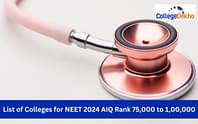Confused between M.Com vs MFA? Check out the major differences and similarities between the courses such as the eligibility criteria, admission processes, syllabus and the career scope. You can learn more about the top commerce colleges that offer M.Com and MFA courses in India.

The commerce field offers numerous specializations and a highly promising career outlook. While a bachelor's degree alone can pave the way for a lucrative career, pursuing a Master's degree further enhances one's qualifications, making their resume more impressive. Among the various degrees available, candidates often opt for either a Master of Commerce (M.Com) or a Masters of Finance and Accounting (MFA).
After completing a postgraduate degree in commerce, one of the common paths chosen is pursuing a Junior Research Fellowship or attempting the UGC NET exam, or even considering a doctoral program in the field. However, there is a scarcity of specialists in the commerce field, which can give a prospective employee a competitive advantage during the recruitment process.
In this article, we will explore the differences and similarities between M.Com and MFA degrees. We will delve into the eligibility criteria, admission processes, and career prospects associated with both M.Com and MFA as postgraduate degrees.
About M.Com Vs MFA
| Course Features | M.Com | MFA |
|---|---|---|
| About | Master of Commerce or M.Com is one of the commonly opted options for many aspirants who wish to pursue a lucrative career, especially in the field of research. | The Master of Finance and Accounting is among the various specialised commerce courses offered in India, training and producing highly skilled professionals in the field of finance and accounting. |
| Duration | M.Com is a 2-year degree programme, offered in many top M.Com colleges in India . | Like M.Com, an MFA degree is a two-year postgraduate degree, offered in many top finance colleges in India. |
| Further Studies | Like many other postgraduate courses in India, For decades, many have chosen to pursue an M.Com course for the purpose of attempting UGC NET or JRF (Junior Research Fellowship or a PhD. | Similar to an M.Com graduate, MFA graduates also have the opportunity to clear UGC NET and pursue a Junior Research Fellowship or PhD. |
| Why Study? |
|
|
Eligibility Criteria: M.Com vs MFA
Like every other course, if you wish to pursue a higher education degree in either of the courses, then you must qualify the requisite eligibility criteria. While each college will define the eligibility criteria for the courses, a general trend is followed among the top commerce colleges in India with respect to M.Com and MFA courses.
Course | M.Com | MFA |
|---|---|---|
Academic Qualification | Bachelor’s Degree in Commerce. Preferably B.Com | Bachelors Degree in Finance, Commerce, Banking or Accounting |
Minimum Aggregate Score Requirement | 50% - 60% |
Course Syllabus - M.Com vs MFA
One of the many differences and similarities you may find between the courses are the subjects that covered under both the degrees. Check out the course syllabus for both M.Com and MFA courses in India.
Master of Commerce (M.Com) | Master of Finance and Accounting (MFA) |
|---|---|
Computer Financial Accounting | Applied Cost Accounting |
Accounting for Managerial Decision | Accounting Theory and Standards |
Financial Management | Business Research |
Statistical Analysis | Cost Control Techniques |
Commercial Bank Management | Investment Portfolio |
International Marketing | Security Analysis |
Financial Markets | Insurance Management |
Banking and Finance | Banking and Finance |
Marketing Management | Financial Services Management |
Economics for Managerial Decision |
Admission Process: M.Com vs MFA
There are two distinct methods of offering admissions to an aspirant of either M.Com or MFA, which includes offering admissions either on merit-basis or on scores obtained in an entrance test. In the case of entrance exams, most of the entrance tests will be conducted at the university-level, in other words, the scores obtained in such an entrance test will be applicable to college or institution affiliated to the university/educational institution conducting the exam.
Check out the different admission processes followed by the commerce college of India.
Merit-Based Admissions
Under merit-based admissions, candidates are selected for admissions based purely on merit. This kind of admission process will be more common for Master of Finance and Accounting courses, however, many M.Com colleges will also be offering admissions on merit-basis as well. You must check out the admission guidelines of the college of your choice prior to applying for admission. Under merit-based admission processes:
The past academic qualifications, such as the 10+2 qualification and the undergraduate qualification will be scrutinised by an admissions committee. Based on the scores obtained by the aspirant in these past academic qualification parameters will be used for calculating the merit of the candidate.
Many colleges will also consider parameters such as the past professional experience or work experience of the candidate.
Apart from the academic and professional qualifications of the candidate, the candidate will also be called for a set of selection processes, which may include a personal interview and group discussion.
Based on the overall performance of the applicant in the selection procedures, including past academic & professional qualifications, personal interview and/or a group discussion, candidates will be offered admissions to the course.
Entrance-Based Admissions
Entrance-based admission procedures will be more common for admissions to the M.Com courses in India. However, this will depend on the admission policy of the colleges offering the course. Many MFA colleges/universities will be conducting entrance tests at the university-level, in order to offer admissions to the aspirants. Under entrance-based admissions:
Aspirants will be asked to appear for the relevant entrance test, conducted by the relevant authority. Once you, an aspirant, has cleared the examination, merit-lists or selection lists will be published by the competent authority.
If applicable, candidates will be called for counselling sessions, through which the candidates will be offered admissions to the relevant course and constituent college based on the scores obtained in the entrance exam.
In case the above point is not applicable, candidates will be called a set of selection procedures which may include a personal interview and/or a group discussion, as per the admission policy of the college in concern.
Based on the overall performance of the candidate in the entrance test, personal interview and/or group discussion, whichever is applicable, candidates will be shortlisted or selected for admissions to the course.
List of Top Colleges in India for M.Com and MFA
If you are interested in enrolling in one of the commerce courses, then check out the list of the top colleges in India for M.Com and MFA. If you are interested in checking out one of the many M.Com or MFA courses offered in the prestigious colleges of India, then you may fill out the Common Application Form , available on our website.
Career Scope and Job Opportunities - M.Com vs MFA
The discipline of commerce and banking might just be one of the more lucrative options available in the world. With a number of job opportunities available for PG commerce graduates, the career scope and job opportunities for commerce graduates are immense. In India, most of the aspirants of the courses pursue with the intent of attempting the UGC NET or pursue a PhD or Junior Research Fellowship (JRF).
Nonetheless, the career opportunities for both M.Com and MFA are exceptionally good with the job options in both the public and private sectors. Here are some of the job profiles, areas of specialization and average initial salary on offer for both M.Com and MFA graduates in India.
Course | M.Com | MFA |
|---|---|---|
Job Profiles |
|
|
Areas of Employmen t |
|
|
Average Initial Salary |
|
|
As mentioned above, graduates of M.Com and MFA mostly opt for attempting the UGC NET examination conducted by NTA. Clearing the exam qualifies the candidates to pursue Junior Research Fellowship or Assistant Professorship, both of which provide a lucrative career option for graduates of both the courses.
Related Articles
Click on the link given below to know more:
For any related queries, drop your questions in CollegeDekho Q&A Section .
Good Luck!
Are you feeling lost and unsure about what career path to take after completing 12th standard?
Say goodbye to confusion and hello to a bright future!

FAQs
The salary of a MFA graduate is explained below:
- The average initial salary can range between ?20,000 - ?45,000 per month.
- Gaining experience would help in earning over ?55,000.
The areas of employment after completing a M.Com course are as follows:
- Finance, Commerce and Banking Sectors
- Indian Civil Services
- Insurance Sector
- Indian Statistical Services
- Customs
- Indian Economic Services
The areas of employment after completing a MFA course are as follows:
- Commerce, Banking and Finance Sectors
- Investment Sector
- Financial Consultancy Companies
- Real Estate
- Indian Economic Services
The job profiles one can get through the M.Com course are:
- Executive Assistant
- Finance Consultant
- Investment and Risk Analyst
- Accountant
- Finance Manager
- Assistant Manager
The job profiles one can get through the MFA course are:
- Operations Manager
- Investment Analyst
- Assistant Accountant
- Marketing Manager
- Auditor
- Tax Consultant/Advisor
The eligibility criteria for a M.Com course is mentioned below:
- Bachelor’s Degree in Commerce. Preferably B.Com
- A minimum percentage of 50%-60%
The eligibility criteria for a MFA course is mentioned below:
- Bachelor's Degree in Finance, Commerce,Banking or Accounting
- A minimum percentage of 45%-50%.
Master of Commerce or M.Com is one of the commonly opted options for many aspirants who wish to pursue a lucrative career, especially in the field of research.
The Master of Finance and Accounting is among the various specialized commerce courses offered in India, training and producing highly skilled professionals in the field of finance and accounting.
Was this article helpful?


















Similar Articles
Best Career Options after BA Economics: Check Scope, Job Profile, Salary and Courses
List of Top Government Jobs after B.Com: Explore Your Options
Ambedkar University BCom Cutoff through CUET 2025
Sri Guru Gobind Singh College of Commerce CUET UG Cutoff 2025: Expected Cutoff based on Previous Trends
Best Courses after 12th for Commerce Students
Top 10 Commerce Colleges in Delhi University